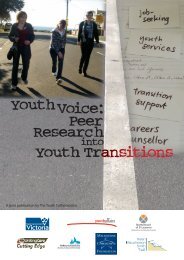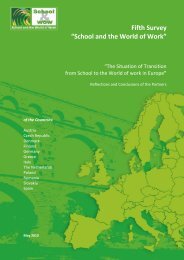Second Survey School and WOW.pdf
Second Survey School and WOW.pdf
Second Survey School and WOW.pdf
Create successful ePaper yourself
Turn your PDF publications into a flip-book with our unique Google optimized e-Paper software.
WORKING GROUP: TRANSITION<br />
IV. Working Group: Transition<br />
IV.1. General remarks<br />
Transition from <strong>School</strong> to the world of work is an approach that provides learning support to<br />
young people as they move from school to work. It encompasses the entire range of learning<br />
<strong>and</strong> training opportunities, <strong>and</strong> career development <strong>and</strong> support mechanisms available to<br />
young people in the post compulsory years. 31<br />
Industry Economy, employers, parents, schools, peer groups <strong>and</strong> the community all play an<br />
important role in helping students make a successful transition from school to the world of<br />
work.<br />
“It is becoming increasingly important for industry <strong>and</strong> employers to engage with schools to<br />
establish partnerships so that young people are ‘work ready’ when they leave school.<br />
Increased engagement will also assist schools in meeting industry <strong>and</strong> employer expectations<br />
of school leavers.”<br />
Like we discussed in Vienna, there are a lot of key factors to make a smooth transition from<br />
school to the world of work. Concerning the theme of the next conference we decided to have<br />
a closer look to the issue of “Youth friendly Society / Youth friendly Economy” a key factor to<br />
build <strong>and</strong> strengthen local partnerships between schools, industry, business, town/community<br />
councils, training organisations, students <strong>and</strong> teachers for “early work experiences” for young<br />
people <strong>and</strong> interactive activities between schools <strong>and</strong> the world of work.<br />
Asked Questions:<br />
IV. 2. Questions<br />
IV.2.1.<br />
IV.2.2<br />
IV.2.3.<br />
What are the most relevant changes in the world of work?<br />
What are the needs <strong>and</strong> dem<strong>and</strong>s in the labour market, in companies, at the<br />
work place addressed to young people <strong>and</strong> vocational start‐ups?<br />
What are the most relevant competences <strong>and</strong> qualifications to remain in<br />
labour market, at the work place, also concerning to the process of lifelong<br />
learning?<br />
IV.2.4 Is yours a youth friendly society <strong>and</strong> youth friendly economy? Please mention 3<br />
points or arguments to support your thesis.<br />
IV.2.5.<br />
Exists a working network between schools <strong>and</strong> political stakeholders, public<br />
institutions related to the <strong>WOW</strong> like labour offices etc. <strong>and</strong> social parts (Trade<br />
31 Based on: “SCHOOL TO WORK TRANSITION, STRATEGIC PLAN, 2007 – 2009”, October 2006<br />
Employment <strong>and</strong> Training Division, The Northern Territory (NT) Government, Australia<br />
‐ 73 ‐




